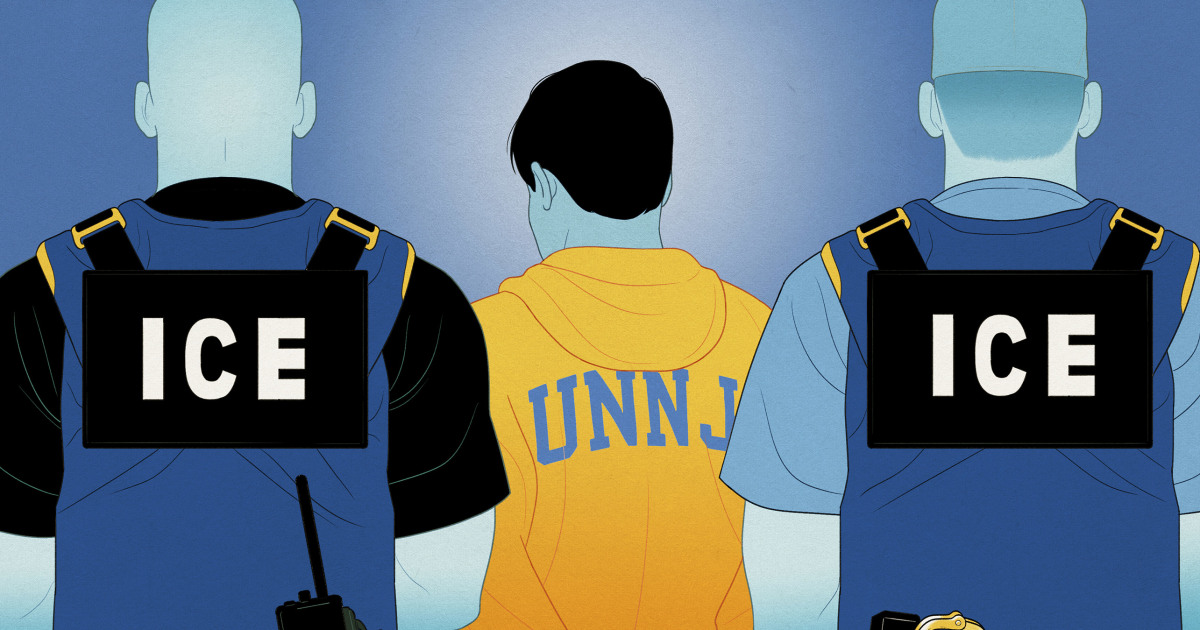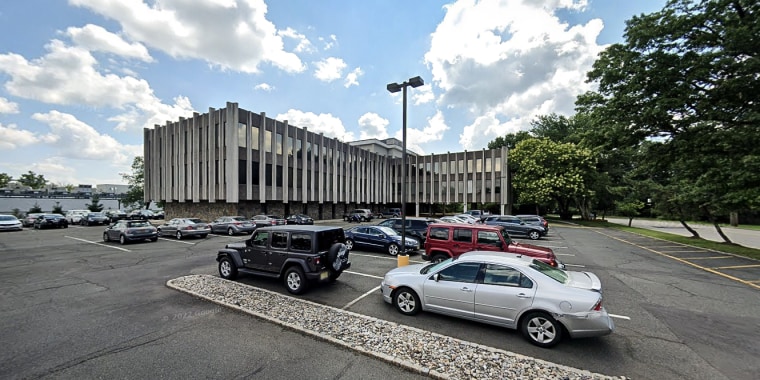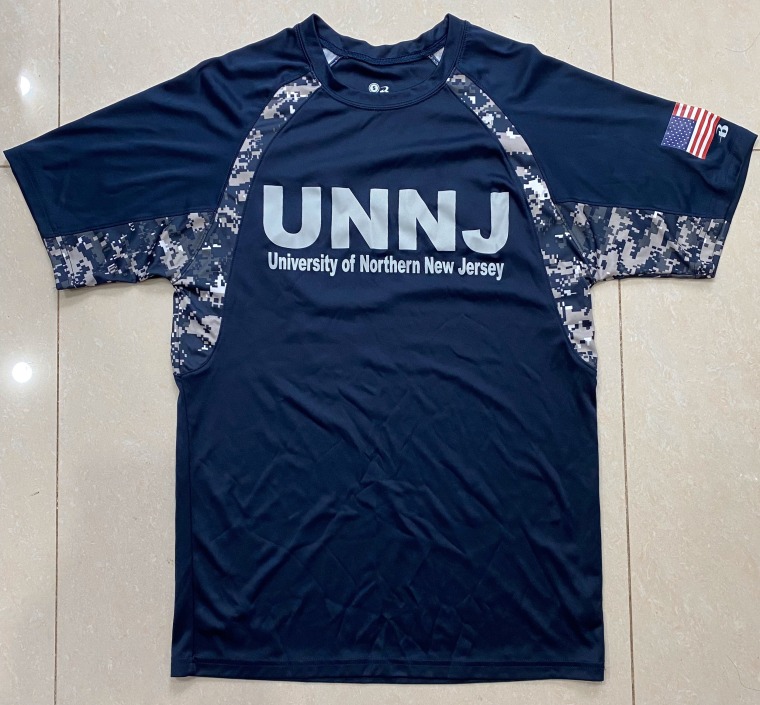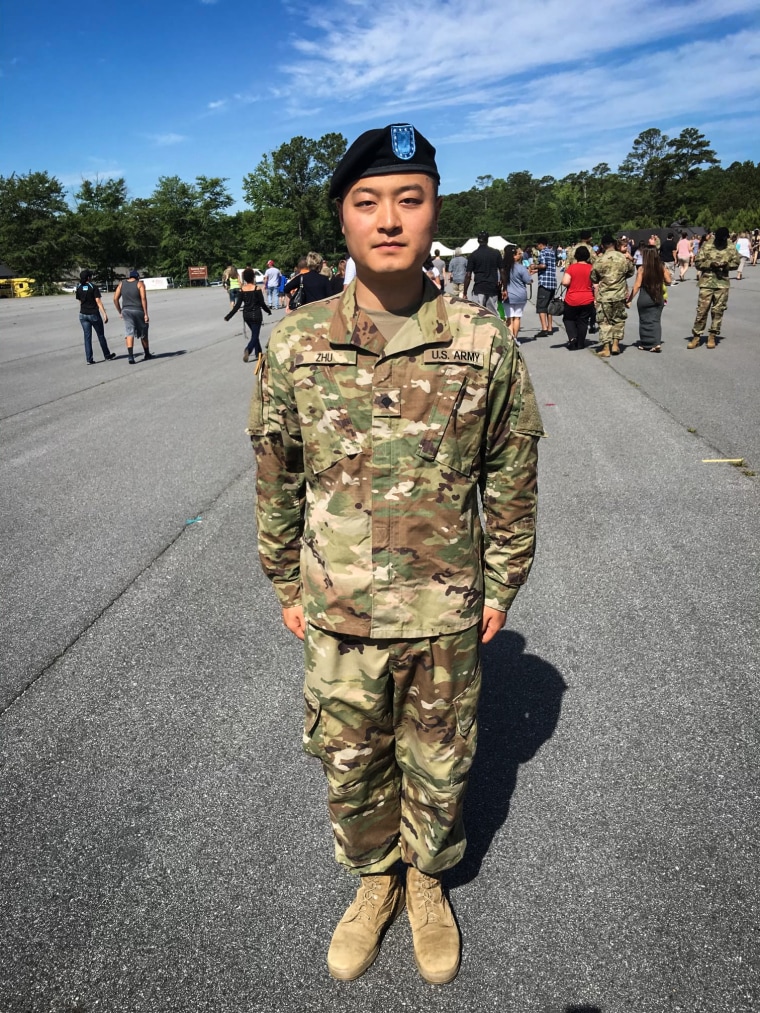ICE set up a fake college to catch fraudsters. Students say they were duped.

Yi Dong found himself in a bind in the fall of 2015.
After graduating from Syracuse University, the 27-year-old Chinese man was accepted into a master’s program in computer science at the University of Northern New Jersey, or UNNJ. The program, he was told, would allow him to stay in the U.S. on a student visa and continue working as a computer programmer. But he was waiting on a visa authorization form, and no one at the school was getting back to him.
With the clock ticking down on his current visa status, Dong, who lived in Brooklyn, New York, decided to rent a car and drive to the college in Cranford, New Jersey.
Inside a three-story building in a leafy office park, he was escorted into the office of a man who identified himself as Dr. Steve Brunetti, the school’s president. Brunetti produced the government form, signed it and handed it over to Dong. He then gave the student a UNNJ T-shirt and snapped a photograph that was soon posted to the school’s Facebook page.
“He told me he was proud of his students,” Dong recalled.

Over the next six months, Dong paid out more than $6,000 in tuition and broker fees, believing he was earning credits toward his degree by continuing to work at his computer programming job. He had received permission from the school to work full time prior to beginning any coursework as part of a government-authorized program that allows foreign students to gain practical skills in their fields of study.
But one day in April 2016, he heard news that he says floored him: Brunetti wasn’t a real administrator — and the University of Northern New Jersey wasn’t a real school.
The university was an elaborate ruse set up by the Department of Homeland Security to lure brokers and recruiters suspected of engaging in student visa fraud.
On that April morning, federal prosecutors announced charges against 21 people who they said arranged for students to enroll at UNNJ in a “pay to stay” scheme (a 22nd person was charged later). The defendants were accused of fraudulently obtaining student visas for about 1,000 foreign nationals in exchange for kickbacks or “commissions.”
Prosecutors said the brokers were told that no classes would be offered and that the school existed only to get immigration status for foreign nationals. The students, prosecutors said at the time, were in on the scam.
But in the ensuing months, a different narrative emerged. A group of students filed a federal lawsuit alleging that they were collateral damage in the sting, duped by both the brokers and the undercover agents who posed as university officials. As the case played out, government lawyers struggled to keep their stories about the students straight — saying in one hearing that they were, in fact, “victims of fraud,” then filing court papers that walked back the statement.
The sting resulted in little in the way of punishment for the brokers, all of whom pleaded guilty. None received prison sentences; more than half were sentenced to a year of probation.
The students, meanwhile, had their lives upended. Though none were criminally charged, they lost thousands of dollars in “tuition” or broker fees and suddenly faced the threat of deportation, according to court documents.
One of them, a Chinese man who had enlisted in the U.S. Army, was booted from the service and spent weeks in an immigration detention center. His naturalization petition was denied, but he has been able to remain in the U.S. while seeking asylum.
Many others scrambled to leave the country, including a Turkish woman who has been barred from returning to the U.S., where her husband has been living since June 2020.
“The people who were really harmed by this were all the students,” said one of the lawyers who filed the suit, Elizabeth Montano of the Miami-based firm Kurzban Kurzban Tetzeli & Pratt.
Federal immigration authorities fought the lawsuit for years but ultimately agreed to settle in a deal granted by the court in January.
Under the deal, which still needs final approval from a judge, the government would pay $450,000 in legal fees but not admit to any wrongdoing. Those who remained in the U.S. would have the ability to reapply for visas without the stain of the case clouding their chances. Those who returned home and wished to secure visas to come back would be at the mercy of local consular officers.
While some of the UNNJ enrollees may have knowingly ignored red flags, multiple immigration lawyers and experts questioned the lengths federal authorities went to in ensnaring the students in the sting, which was launched during the Obama administration.
“I think it was wrong that the government did this,” said Allan Wernick, a longtime immigration lawyer and the director of CUNY Citizenship Now, which provides legal services to immigrants at centers across New York City. “I think they’re really taking advantage of people. And what were they accomplishing?”
An ICE spokesperson declined to comment. “As a matter of policy, U.S. Immigration and Customs Enforcement does not comment on litigation proceedings or outcomes,” the spokesperson said.
A Justice Department spokesperson also declined to comment, citing the litigation.
A complex and confusing system
Studying at a U.S. university has long been a prized goal for young people around the world. Attracting bright and motivated students from abroad also benefits the U.S.
Nearly a quarter of billion-dollar startup companies in the U.S. have founders who first came to America as international students, according to a 2018 study by the National Foundation for American Policy.
The foreign nationals who enrolled at UNNJ were almost all master’s-level students who had previously attended U.S. colleges and were hoping to remain in the country. In many cases, they had already secured jobs but had lost out on the chance to get H-1B visas for highly skilled temporary workers, which are awarded through a lottery system.
With their student visas set to expire, they were looking for ways to remain in the country legally. In many cases, the goal was to stay for another year to give them a chance to secure coveted H-1B visas.
Enrolling in a graduate program offered them a legal pathway, but the process is complex, and the system is difficult to navigate on one’s own, immigration and higher education experts say.
That’s where brokers and agents come in. They act as coaches and facilitators who — for a fee — can help steer international students toward programs and assist them in overcoming bureaucratic hurdles to secure visas.
“They become the bridge to help you understand and navigate what is a very complicated and very confusing system,” said Fanta Aw, the vice president of campus life and exclusive excellence at American University in Washington, D.C., and a former president of NAFSA: Association of International Educators.
Over the years the system has been exploited by people who have set up fake companies and bogus schools in schemes to profit off students seeking visas.
Federal authorities have said they set up UNNJ to better understand how brokers operate in tandem with sham schools that essentially act as visa mills.
“‘Pay to stay’ schemes not only damage our perception of legitimate student and foreign worker visa programs, they also pose a very real threat to national security,” Paul Fishman, who was in charge of the U.S. Attorney’s Office in New Jersey at the time, said at the news conference in 2016.
An elaborate deception
To someone scanning the internet, the University of Northern New Jersey would have looked every part a real college.
Its now-defunct website, www.unnj.edu, trumpeted the school as a place that offered a “high quality American education to students from around the world.”
“This education is based on a foundation of intense academics and real world business experiences set in beautiful Cranford, New Jersey and the surrounding northern New Jersey and New York City areas.”
The school’s social media accounts informed students when UNNJ was closed for inclement weather and even posted wedding pictures after two of UNNJ’s “alumni” were married.

“The only thing lacking appears to be reference to UNNJ’s men’s or women’s basketball team in the Final Four of the National Collegiate Athletic Association’s basketball tournament,” a U.S. appeals court said in 2019.
Students who did their own research would have had little reason to suspect it was a sham. The school was accredited by the state of New Jersey, and DHS listed UNNJ on its website of approved institutions.
For foreign students looking to remain in the country and work, it had particular appeal.
UNNJ offered its students the opportunity to participate in Curricular Practical Training, which allows foreign students to work for U.S. companies as part of their education. It’s offered during an academic program — to give students the opportunity to apply what they learned in real-world settings — but UNNJ allowed students to work before they began any coursework.
“I’m not aware of any institution that offers that,” Aw said. “This to me is what the agents knew would be a very attractive feature and is what they would have sold the students on.”
Immigration experts said UNNJ enrollees wouldn’t have had any reason to suspect something was amiss at first given that the school issued I-20 forms, which are DHS documents that indicate that foreign students are enrolled in college, authorizing Curricular Practical Training.
“I think that’s the most egregious part of this,” said Wernick, the New York immigration lawyer. “They were issuing genuine I-20s and basically telling people this is what the rules are.”
But any students who were enrolled in the school for more than six months should have grown suspicious about the absence of coursework, immigration and international education experts said.
“That’s when they should have been asking questions,” Aw said.
Booted from the Army
Xilong Zhu arrived in the U.S. from China at age 18 to attend Beloit College, a liberal arts school in Wisconsin. He developed a deep fondness for America — its culture, its politics — and wished to become a U.S. citizen. When he learned about a U.S. military program that offers foreigners a fast track to citizenship, he was elated.
“I think it is a great honor and privilege to be able to join a military that is not a Communist Party army,” he said.
Zhu began the enlistment process but soon learned that his student visa status was likely to expire before he was accepted into the Army. On the advice of a friend, he reached out to US Quickly Consulting Center, a company that provides education consultation to foreign students. A US Quickly employee told Zhu, who was working at an Apple retail store at the time, that the University of Northern New Jersey offered a program that would allow him to continue working and maintain his student visa status, according to court papers.
It would essentially offer him a bridge to remain in the country legally as he waited for word from the Army. But Zhu says he was skeptical at first that he could get a student visa without attending class.
“I asked her on the phone, ‘Is this legal?’” Zhu said. “She said: ‘Yes, of course. It’s on the USCIS website. You can check yourself.’” USCIS is U.S. Citizen and Immigration Services.

He applied to UNNJ, got accepted and received an I-20 form that authorized him to work full time. He made a payment of $8,000 to the broker, which he was told would cover her fees and his entry to the school.
At one point in the process, Zhu connected with the director of the international program at Beloit to get paperwork transferred.
“That cleared the last doubt I had about the legitimacy of the school,” he said. “She would not have transferred everything over had she realized the school was a setup.”
Zhu signed an enlistment contract in September 2015 and reported for basic training at Fort Benning, Georgia, on March 29, 2016. DHS confirmed his valid student visa status with the Defense Department.
But eight days later, he was pulled out of drills and interrogated by a military investigator. Zhu, who had no access to the internet during basic training, had no idea that prosecutors had announced the school was part of a sting operation.
“I was shocked,” Zhu said, adding that he explained the steps he took to enroll at UNNJ. “I told him I even had the DHS approval letter. How could it be possible that the school is a fake one?”
Zhu was allowed to complete basic training but was discharged from the service in November 2016. ICE agents arrested him at the base and took him to a detention facility, where he remained for 21 days while he awaited word on his deportation.
He ultimately received an honorable discharge from the military, opening the door for him to apply for U.S. citizenship. But the days and months after his release from the detention center were miserable.
“I couldn’t work. I was living on credit card debts,” Zhu said. “It was very hard to find any life goals at that time.”
Lawyers for UNNJ students filed the class-action lawsuit in March 2017. The suit was initially dismissed by a lower court, but it was revived by the 3rd U.S. Circuit Court of Appeals. In its 23-page ruling, the court noted that during oral arguments in September 2018, government lawyers said for the first time that their position was not that the students had committed fraud.
“Rather, the government believed that the students were the victims of fraud,” the ruling said. “The government twice stated that the students ‘were caught up in it in the sense that they were victim by the academic recruiters’ and that ‘[t]here was no fraud here. These students, as far as we are concerned, were the victims of fraud.’”
The ruling went on to note that the “government changed course yet again” in court papers filed the next month. “The government now asserted that some of the students ‘in all likelihood, knew that their academic recruiters were committing visa fraud’ and others even ‘conspired with their academic recruiters to commit visa fraud,’” the ruling said.
Zhu’s application for naturalization has been denied twice because of a “lack of good moral character” related to his enrollment at UNNJ, according to a copy of the decision. His lawyer, Margaret Stock, said the proposed settlement gives her confidence that the government will finally grant it.
But Zhu isn’t especially optimistic.
“After so many years, I’m numb,” he said. “I’m not holding my breath for anything. Even though it could be good news, I have lost all faith in the immigration system.”
Jill Welch, a senior policy advisor at the Presidents’ Alliance on Higher Education and Immigration, an advocacy group, said she believes the UNNJ case underscores the need for Congress to update the nation’s immigration laws to better accommodate foreign students who wish to remain in the country to work.
“We all win when that happens,” she said. “The situation we have here is our own government, rather than focusing on how we can make it easier for students to work here, set up a fake university in order to lure these students into believing it would help them gain the practical applied learning experience they were seeking.”
In 2019, federal prosecutors in Michigan announced charges against eight brokers in connection with their involvement in a second fake school set up by ICE, the University of Farmington in Farmington Hills. They were accused of helping more than 250 foreign students obtain visas.
Dong, the Chinese man who showed up at UNNJ, endured a brutal stretch after prosecutors revealed the sting operation. His visa status was terminated, and he lost his job. He says he moved into a tiny room in a cramped apartment in Chinatown, lost his girlfriend and fell into debt.
But he went on to marry a U.S. citizen, which ultimately allowed him to secure a green card and remain in the country. Still, Dong said, he only recently stopped having a recurring nightmare that involved him going back to China and finding out he could never return to the U.S.
“That same nightmare came again and again and again,” he said.






